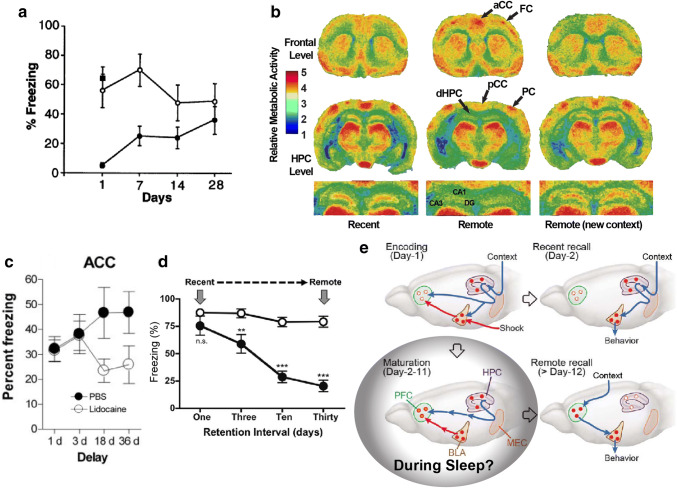Fig. 1.
Evidence of memory corticalization. a Rats trained in a classical CFC protocol and submitted to electrolytic lesions bilaterally in the dorsal HPC (filled circle) or the cortex above it (filled square) 1, 7, 14 or 28 days after training show different patterns of behavior; indicating a progressive disengagement of the HPC in contextual fear memory retrieval. (open circle), control. [282]. b (14C)2-deoxyglucose color-coded autoradiographs from mice trained in a spatial discrimination task and tested after either a 5-days (recent—left column) or a 25-days (remote—middle and right columns) delay. The right column shows the results for a representative animal of the group that was trained in a given context and tested in a different one. Note the different activation pattern between recent and remote conditions within the highlighted regions. aCC anterior cingulate cortex, FC frontal cortex, pCC posterior cingulate cortex, PC parietal cortex, dHPC dorsal HPC, CA1 and CA3 Cornu Ammonis areas 1 and 3, respectively, DG dentate gyrus (modified from [23]). c Rats also trained in a CFC protocol but with a pharmacological inactivation of the ACC show a progressive engagement of the ACC in the retrieval of fear memory (modified from [56]). d Rats with excitotoxic lesions bilaterally in the dorsal HPC were trained ~ 12 days after surgery in a strong CFC protocol (prolonged exposure to the context and strong multiple shocks), which was previously shown to produce fear conditioning in the absence of the HPC. Animals were tested 1, 3, 10, or 30 days after training and, compared to animals with intact HPC, they showed a reduced memory persistence, indicating a requirement of the HPC to memory consolidation (modified from [78]). e Schematic of the regions related to encoding, maturation, recent and remote retrieval of CFC assessed at the level of neuronal engrams and cross-regional projections. These results corroborate previous findings related to the HPC-dependence for recent memory retrieval and consolidation, here described as PFC engram maturation, which becomes progressively sufficient for remote memory retrieval. It also raises the question about the mechanisms and behavioral states related to this maturation process. Is sleep involved?
(modified from [ 18 ])

